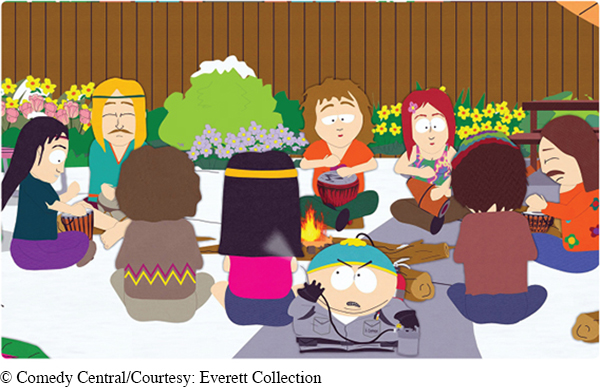Prejudiced Language
As Chapter 4 discusses, prejudice means presuming negative things about other people based on their group affiliation (ethnicity, religion, age, gender, sexual orientation). It is a negative form of stereotyping. People who use prejudiced language speak in ways that display contempt, dislike, or disdain for a group or its members. In South Park, for example, Cartman uses prejudiced language almost constantly when he talks with his Jewish friend Kyle and when he sees hippies—
South Park’s Eric Cartman is the cartoon definition of how not to communicate. His unabashed bad behavior is shocking but also shows viewers the consequences of poor communication skills. How do you handle any real-

There are as many types of prejudiced language as there are groups. A person can use language that’s prejudiced toward men or women (sexist language) or toward gays, lesbians, bisexuals, or transgender persons (homophobic language). It can also be used to criticize various ethnicities (racist language), people of different ages (ageist language), and even socioeconomic groups (classist language). Some people use prejudiced language when discussing physical or mental disabilities, political affiliations, social or religious groups, and even college majors.
Most of us readily recognize racist, sexist, and disability-
What can you do if another person’s language is prejudiced and offensive? As we discuss in Chapter 8 about managing conflict, confronting others is rarely easy, but it can be done. Consider the following suggestions:
Determine the risk of confrontation. Is the person likely to be open to your point of view? A friend, family member, or peer may be willing to listen. However, if it’s a stranger or someone with power over you (like your boss), it might be best to ignore the comments or to leave the situation.
If you choose to confront the person, avoid an approach that causes the person to lose face, creating embarrassment. Instead, talk with the person privately, and open with an affirming statement (“I know that you probably mean no harm when you say, ‘That’s so gay’”).
Next, state your feelings about the prejudiced language, and politely ask the person to revise his or her language (“I feel uncomfortable with this phrase because I have a brother who’s gay; I would appreciate it if you didn’t use it”).
Finally, listen to and acknowledge what the person says in response. If necessary, reassert your request that the prejudiced language be avoided (“I understand that you mean nothing by it, but I would still appreciate it if you didn’t use it”).